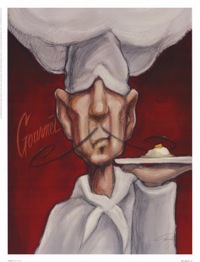Difference between revisions of "Gourmet"
(Created page with 'File:lighterstill.jpgright|frame ==Origin== French, from Middle French, alteration of ''gromet'' boy servant, vintner's assistant, probably ultimately f...') |
m (Text replacement - "http://" to "https://") |
||
| Line 2: | Line 2: | ||
==Origin== | ==Origin== | ||
| − | French, from Middle French, alteration of ''gromet'' boy servant, vintner's assistant, probably ultimately from [ | + | French, from Middle French, alteration of ''gromet'' boy servant, vintner's assistant, probably ultimately from [https://en.wikipedia.org/wiki/ Middle English] ''grom'' groom |
| − | *[ | + | *[https://en.wikipedia.org/wiki/19th_century 1820] |
| − | The word ''gourmet'' is from the French term for a wine broker or ''[ | + | The word ''gourmet'' is from the French term for a wine broker or ''[https://en.wikipedia.org/wiki/Taste-vin taste-vin]'' employed by a wine dealer. ''Friand'' was formerly the reputable name for a connaisseur of delicious things that were not eaten primarily for nourishment: "A good gourmet", wrote the conservative eighteenth-century ''[https://en.wikipedia.org/wiki/Dictionnaire_de_Tr%C3%A9voux Dictionnaire de Trévoux]'', employing this original sense, "must have ''le goût friand'', or a refined palate. The [[pleasure]] is also [[visual]]: ''"J'aime un ragoût, et je suis friand"'', [https://en.wikipedia.org/wiki/Giacomo_Casanova Giacomo Casanova] declared, "mais s'il n'a pas bonne mine, il me semble mauvais". In the eighteenth century, gourmet and gourmand carried disreputable connotations of [[gluttony]], which only ''gourmand'' has retained. Gourmet was rendered respectable by [https://en.wikipedia.org/wiki/Alexandre_Balthazar_Laurent_Grimod_de_La_Reyni%C3%A8re Monsieur Grimod de la Reynière], whose ''Almanach des Gourmands'', essentially the first restaurant guide, appeared in Paris from 1803 to 1812. Previously, even the liberal [https://en.wikipedia.org/wiki/Encyclop%C3%A9die Encyclopédie] offered a moralising tone in its entry ''Gourmandise'', defined as "refined and uncontrolled [[love]] of [[good]] [[food]]", employing reproving [[illustrations]] that contrasted the frugal ancient [https://en.wikipedia.org/wiki/Sparta Spartans] and Romans of the Republic with the [[decadent]] [[luxury]] of [https://en.wikipedia.org/wiki/Sybaris Sybaris]. The [https://en.wikipedia.org/wiki/Jesuits Jesuits]' ''Dictionnaire de Trévoux'' took the Encyclopédistes to task, reminding its [[readers]] that ''gourmandise'' was one of the [https://en.wikipedia.org/wiki/Seven_Deadly_Sins Seven Deadly Sins]. |
==Definitions== | ==Definitions== | ||
| − | *1: a [ | + | *1: a [https://en.wikipedia.org/wiki/Connoisseur connoisseur] of [[food]] and drink; broadly |
==Description== | ==Description== | ||
| − | '''Gourmet''' is a cultural [[ideal]] associated with the [ | + | '''Gourmet''' is a cultural [[ideal]] associated with the [https://en.wikipedia.org/wiki/Culinary_art culinary arts] of fine food and drink, or ''[https://en.wikipedia.org/wiki/Haute_cuisine haute cuisine]'', which is characterised by refined, even elaborate preparations and presentations of [[aesthetically]] [[balanced]] meals of several contrasting, often quite rich courses. The term and its associated [[practices]] are usually used positively to describe people of refined taste and [[passion]]. |
| − | The term ''gourmet'' may refer to a person with refined or [[discriminating]] taste who is knowledgeable in the craft and [[art]] of food and food preparation. Gourmand carries additional connotations of one who simply enjoys food in great quantities. An ''[ | + | The term ''gourmet'' may refer to a person with refined or [[discriminating]] taste who is knowledgeable in the craft and [[art]] of food and food preparation. Gourmand carries additional connotations of one who simply enjoys food in great quantities. An ''[https://en.wikipedia.org/wiki/Epicure epicure]'' is similar to a gourmet, but the word may sometimes carry overtones of excessive refinement.[https://en.wikipedia.org/wiki/Gourmet] |
[[Category: General Reference]] | [[Category: General Reference]] | ||
Latest revision as of 00:16, 13 December 2020
Origin
French, from Middle French, alteration of gromet boy servant, vintner's assistant, probably ultimately from Middle English grom groom
The word gourmet is from the French term for a wine broker or taste-vin employed by a wine dealer. Friand was formerly the reputable name for a connaisseur of delicious things that were not eaten primarily for nourishment: "A good gourmet", wrote the conservative eighteenth-century Dictionnaire de Trévoux, employing this original sense, "must have le goût friand, or a refined palate. The pleasure is also visual: "J'aime un ragoût, et je suis friand", Giacomo Casanova declared, "mais s'il n'a pas bonne mine, il me semble mauvais". In the eighteenth century, gourmet and gourmand carried disreputable connotations of gluttony, which only gourmand has retained. Gourmet was rendered respectable by Monsieur Grimod de la Reynière, whose Almanach des Gourmands, essentially the first restaurant guide, appeared in Paris from 1803 to 1812. Previously, even the liberal Encyclopédie offered a moralising tone in its entry Gourmandise, defined as "refined and uncontrolled love of good food", employing reproving illustrations that contrasted the frugal ancient Spartans and Romans of the Republic with the decadent luxury of Sybaris. The Jesuits' Dictionnaire de Trévoux took the Encyclopédistes to task, reminding its readers that gourmandise was one of the Seven Deadly Sins.
Definitions
- 1: a connoisseur of food and drink; broadly
Description
Gourmet is a cultural ideal associated with the culinary arts of fine food and drink, or haute cuisine, which is characterised by refined, even elaborate preparations and presentations of aesthetically balanced meals of several contrasting, often quite rich courses. The term and its associated practices are usually used positively to describe people of refined taste and passion.
The term gourmet may refer to a person with refined or discriminating taste who is knowledgeable in the craft and art of food and food preparation. Gourmand carries additional connotations of one who simply enjoys food in great quantities. An epicure is similar to a gourmet, but the word may sometimes carry overtones of excessive refinement.[1]
